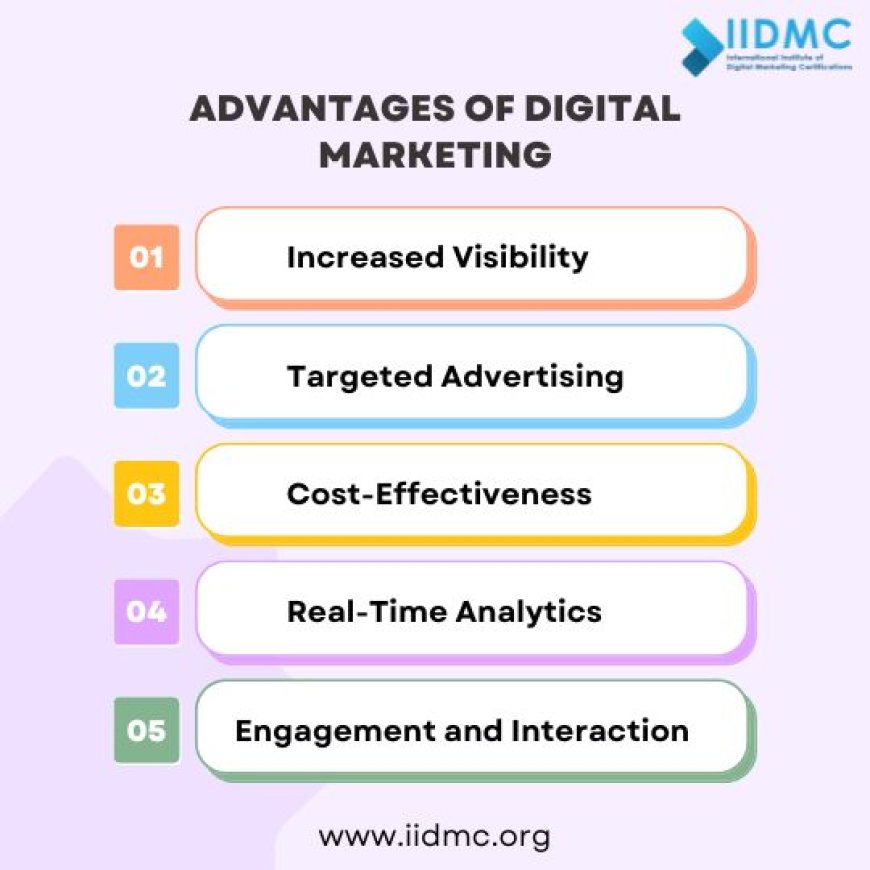The Advantages of Digital Marketing
Explore the perks of digital marketing for your business. Reach more customers, save costs, and target your audience effectively with this powerful tool.

Businesses have lots of chances to interact with their target audience like never before in modern times. Given its many benefits over traditional marketing strategies, digital marketing has become a necessity for managing this new environment. The advantages of digital marketing, from improved reach and targeting to cost-effectiveness and real-time analytics, are changing how companies interact with their clients.
Let's first review what digital marketing is and then move on to discussing its benefits. Digital marketing, at its foundation, includes all online techniques and approaches used to advertise goods and services. This covers platforms including email, social media, mobile apps, websites, and search engines. Digital marketing uses the internet to contact customers where they spend a lot of time: online. This is in contrast to traditional marketing, which mostly focuses on print ads, TV commercials, and billboards.
The main Advantages of Digital Marketing are
-
Increased Visibility: Digital marketing gives companies rapid access to a worldwide audience. Businesses may increase their online presence and draw in more leads by implementing search engine optimization (SEO) and paid advertising strategies.
-
Targeted Advertising: Digital marketing allows for more exact targeting than traditional approaches. Businesses can ensure improved conversion rates by customizing their campaigns to target certain demographics, interests, and behaviours with platforms like Facebook Ads and Google Ads.
-
Cost-Effectiveness: When compared to traditional advertising, digital marketing has a higher return on investment. Pay-per-click (PPC) advertising is a financially advantageous choice for startups and small enterprises because it only costs money when people click on the adverts.
-
Real-Time Analytics: The capacity to monitor and assess campaign effectiveness in real-time is one of the main benefits of digital marketing. Through website traffic and conversion rates, organizations can obtain important insights to enhance outcomes and optimize their strategies.
-
Engagement and Interaction: Businesses can directly interact with their audience by using email campaigns and social media marketing. Long-lasting customer relationships can be established by cultivating meaningful encounters that enhance brand loyalty and trust.

Is Digital Marketing Suitable for All Businesses?
Digital marketing refers to a variety of online methods, including search engine optimization (SEO), content marketing, social media marketing, and email advertising. These strategies have numerous advantages, but their usefulness varies according to a company's aims, customer base, and industry.
Digital marketing has altered how firms reach and interact with their customers. Almost every organization may profit from some form of digital marketing, since it allows them to measure outcomes, target specific demographics, and quickly alter strategy based on data analysis. However, the quantity and type of digital marketing methods used might vary significantly depending on a variety of circumstances.
Detailed Analysis
1. Business Goals and Objectives
-
Specific Approaches Select digital marketing tactics such as PPC for speedy conversions or SEO for brand visibility that are precisely in line with particular business objectives.
-
The ability to scale Businesses may scale operations and adjust strategies as they grow with the help of digital marketing.
-
Performance tracking makes use of instruments to track and evaluate marketing campaign performance, guaranteeing that investments are directed toward certain objectives.
-
Flexibility allows for quick technique changes in response to changing market conditions and corporate requirements.
2. Target Audience
-
Online Presence More effective for internet viewers who frequently use digital gadgets.
-
Demographic Specificity Tools such as social media ads enable targeting based on certain demographics, interests, and behaviours.
-
Customer engagement enables direct and regular interaction with customers via commonly used channels.
-
Accessibility Some populations may be less engaged online, reducing the effectiveness of digital marketing.
3. Industry Characteristics
-
Product Visualization Ideal for industries where visual representation grabs customer attention, such as fashion and real estate.
-
Content Delivery: Effective in areas that benefit from extensive information sharing, such as technology and healthcare.
-
Professional Networking: B2B sectors benefit greatly from platforms that promote professional networking and industry-specific content.
-
Market saturation In increasingly competitive marketplaces, digital marketing can provide new opportunities for standing out.
4. Budget Constraints
-
Many types of digital marketing, such as social media and SEO, need a little initial expenditure.
-
Digital marketing provides exact tracking of return on investment, enabling more efficient budget allocation.
-
Small firms may need to decide which digital marketing methods to use based on the resources available.
-
Some tactics, such as content marketing, take a longer timeline to see results, which may influence budget selections.
5. Geographical Reach
-
Local SEO and focused advertising can significantly boost foot traffic and local awareness.
-
Digital platforms enable market development beyond local limits without incurring significant financial costs.
-
Cultural adaptation enables marketing adaptations that acknowledge and respond to cultural differences in worldwide marketplaces.
-
Effective for entering new or specialized markets by exploring several techniques with low risk.
How does digital marketing differ from traditional marketing?
Digital marketing and traditional marketing are various types of advertising that use different methods to reach consumers. Traditional marketing uses outlets such as television, radio, newspapers, and billboards. These platforms enable a wide reach but can lack the precision of digital strategies. In contrast, digital marketing makes use of the internet and digital technologies including social media, email, search engines, and websites. This strategy enables marketers to target certain demographics based on data such as age, interests, and browsing behaviour. The immediacy of digital marketing also allows for real-time involvement and feedback via interactive components, something older techniques cannot deliver.
The fundamental differences also apply to measurement and analytics. Traditional marketing tactics, which rely mostly on consumer surveys and sales data, can be difficult to assess in terms of performance and ROI. However, digital marketing offers complete analytics, allowing for detailed tracking of user interactions, engagement rates, and conversion metrics. This data-driven understanding enables more refined marketing tactics and can result in more efficient budget allocation. Keywords for this topic include digital marketing methods, traditional advertising channels, real-time interaction, targeted advertising, and marketing ROI. Overall, while both types of marketing are valuable, digital marketing provides more flexibility and tracking options, which are more in line with current customer behaviour.
Digital marketing is a different and effective approach for companies to reach and engage with their worldwide audiences. Companies may achieve specific goals, adjust to market changes, and maximize ROI by implementing real-time analytics and customized advertising tactics such as SEO, PPC, and social media marketing. However, the efficacy of these strategies varies according to industry, audience, and aims. Businesses must be patient and persistent, as effects can range from instant to long-term, necessitating continuous adjustment to maintain development and success.


























